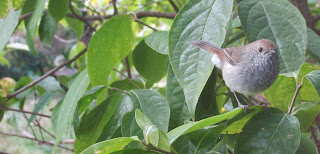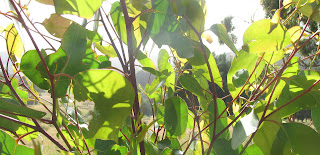Fever
You come and go by daylight. You make people out by daylight. But suddenly it’s midnight. There’s no sun, no moon, no lamp. If it’s a place where you’ve been, then of course it’s possible – but if it’s a place you’ve never been, how will you get hold of something? Yunmen
O the mind, mind has mountains; cliffs of fall … GM Hopkins
Equinoctial gales have begun. At the start of the month, a wild westerly stream encompasses the whole island, bringing massive swells to exposed beaches, touching up the wind-shorn manicure of coastal and alpine vegetation, combing twigs and leaves and dead wood from the forests to litter the ground. Despite this, the pigeon is raising another brood on the meagre twig platform in the birches where she brought out young in January.The autumn world goes about its business. Wattlebirds and families of currawongs feast on ripe pears. Flocks of thornbills gather, stopping at the water pots, checking the wintersweet outside my window for insects, letting fall their waterdrop songs. One pair has become fascinated by their reflections in the window. I love the opportunity to be so close to them through the glass and also I feel anxious about how much energy they put into confronting an imaginary enemy. The pardalotes come back to check out last year’s nest. It seems that birds are pairing up already even though the solstice is months away. What do they know about the coming season?
We cook pears till they’re pink then bottle them; the smallest onions go into the pickle bucket; gherkins go into brine. This year’s hawthorn tincture is ready to strain and bottle; the hypericum flowers on and on. Beans dry in their pods as we continue to eat last season’s crop of haricots, boiled and added to a sauce of slow roasted tomato and onion with haloumi and cumin seed – the world’s best baked beans on toast. Field mushrooms pop up here and there, and the perfect red and white caps of Amanita start to appear under the birches and pines.
After a gap of decades, I’m taking up flute once more so that I can join the beginners in the local concert band to add my boops and screes to something that is more than the sum of its parts. It’s a strange experience to read the music after such a long time – automatic recognition of the high notes takes a while to come back to me, but body memory moves my fingers with another kind of knowing that’s there before thought. If I throw myself into the stream of the music, my hands know what to do. It makes me very happy to sit among a group of children and adults making noise together. Laughter rises in my chest at the thought and sight and sound of us.
Soft rain circles in from the east. I love it and turn my face to its touch all the more gladly as the series of rainy seasons we’ve had for the last few years seem likely to be coming to an end, with years of drought about to begin. Trees everywhere have used the extra moisture to grow long shoots and add to their girth. Down in the forest, the tree-trunk hole where the nightjar nested has grown over – its lips of bark have closed and now the opening is sealed. I think of the dark interior space, persisting, perhaps opening again some other year to invite in other guests.And now I develop chills and a cough and my throat is so sore it feels burned. I shut myself away and test for covid – positive. The sore throat is how I remember every winter as a child; I enjoyed the time out it offered then – permission to stay home from school, to stay in bed and read – and it still feels luxurious to be able to give myself up and drift. T brings me a bunch of black grapes from the polytunnel – their bloom, their smell, their sweet-tart juice and crunchy seeds fill my awareness. With the magnified vision of sickness I see that in each bunch some fruit has grown and some has remained undeveloped – little green pinheads close to the stem. Gratitude to the vine doing its flourishing out there in daylight and darkness. Each thing near and particular, and all of it, the planet too, rising into being and dying away.
On a day of sun I sit outside and let it breathe me to redgold translucency. The sensation seems to match my fever, and all the air is breathing too, close by in the garden and out in the windbreaks and forest, restless. A gap has opened in the magnetic field of the planet and for hours, the solar wind streams in; when night comes, auroral fires light the skies far from the poles. No one really knows what causes such gaps to appear; one theory is that a charged magnetic stream from the sun meets its opposite charge in an area of Earth’s field. Where this happens, the magnetosphere is neutralised and energy pours through.
I’m thinking about all the people who’ve been sick and those who have died over the course of the pandemic. Thinking about those shifts of circumstance – whether through illness or accident or social upheaval or a fight between friends – when the bottom falls out of the known world. Previous ways of organising our awareness no longer apply and some things once taken for granted change irrevocably – for instance the sense of understanding and being understood; the sense of how life will proceed.
How to be with the fevers that grip and carry us off? Transformed by our meetings with the world, and the world itself opened for better and for worse by our changes, how can we find a way to ride the current of what is? Can we remember a time not-yet-known when, separate-and-together, we let freedom run through us like music, clumsy and willing as we are?
References
Gerard Manley Hopkins. ‘No worst, there is none.’ Poems and Prose. Penguin Classics, 1985.
Excerpt from The Record of Yunmen. Pacific Zen Institute: www.pacificzen.org






Comments
Post a Comment